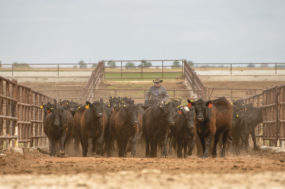The basic purpose of state workers’ compensation acts is to provide a quick and efficient manner of indemnifying disabled workers at reasonably low cost to the employer. Generally, an employer pays to obtain workers’ compensation insurance coverage and, in the event that an employee is injured on the job, the employee may seek to recover costs associated with the injury from their employer’s workers’ compensation insurance carrier.
 Oftentimes, if an employer carries workers’ compensation coverage, employees are required to seek recovery under workers’ compensation as an exclusive remedy rather than be allowed to go to court and pursue traditional channels of litigation.
Oftentimes, if an employer carries workers’ compensation coverage, employees are required to seek recovery under workers’ compensation as an exclusive remedy rather than be allowed to go to court and pursue traditional channels of litigation.
How workers’ compensation laws apply to agriculture varies greatly among states. Some states require agricultural laborers be covered to the same extent as other workers pursuant to the states’ laws.
Other states require that laborers working on larger operations be covered while exempting employees of smaller farms and ranches. On the other hand, several states do not require any workers’ compensation of agricultural employees.
The issue of workers’ compensation and agriculture has been in the news a great deal recently in New Mexico. In June, the New Mexico Court of Appeals held that the law exempting certain agricultural workers from mandatory workers’ compensation coverage was unconstitutional.
Two agricultural employees injured on the job – one as a chile picker and another as a dairy milker – filed suit after they were denied workers’ compensation benefits. Under New Mexico law, the Workers’ Compensation Act does not apply to “employers of farm and ranch laborers.”
The laborers argued this clause violated the Equal Protection Clause of the New Mexico and U.S. constitutions. The Court of Appeals agreed, holding the exemption unconstitutional. The case has been appealed to the New Mexico Supreme Court, who has issued a stay on the lower court’s decision pending ruling by the supreme court.
If an employee is injured at work, generally workers’ compensation requires the employee to report the injury to the employer within a certain time frame, set by statute. Again, the specifics vary greatly by state.
For example, in North Carolina, employees have just 30 days to report an injury, while in Pennsylvania employees have up to 120 days. Employers should also be aware of injury-reporting requirements under the Occupational Safety and Healthy Administration (OSHA) and state occupational health and safety acts.
As you can imagine, when an injury occurs, a number of facts must be considered in determining whether workers’ compensation coverage will apply. Is the injured party an employee, or an independent contractor or volunteer who may not be covered? Was the injury self-inflicted (which could result in denial of benefits)?
Did the injury actually occur during the course and scope of employment? Was the employee under the influence of alcohol or illegal drugs at the time of the injury? These type of questions are just examples of the factual analysis that must be conducted when an employee is injured at work.
All agricultural employers and employees should be generally familiar with the workers’ compensation and workplace safety laws in their state. Employers should carefully consider whether they are required to (or should voluntarily) provide workers’ compensation coverage, while employees should ensure they understand the rules and requirements they will need to follow in the event an on-job injury occurs.
Employers should be aware of any state laws regarding required posters in the workplace explaining employee workers’ compensation rights. Finally, all managers should be trained on appropriate reporting of workplace issues, as they are often the first to learn of injuries. ![]()
PHOTO: Employee on crutches. Photo by Thinkstock

-
Tiffany Dowell Lashmet
- Assistant Professor and Extension Specialist - Agricultural Law
- Texas A&M AgriLife Extension Service
- Email Tiffany Dowell Lashmet








